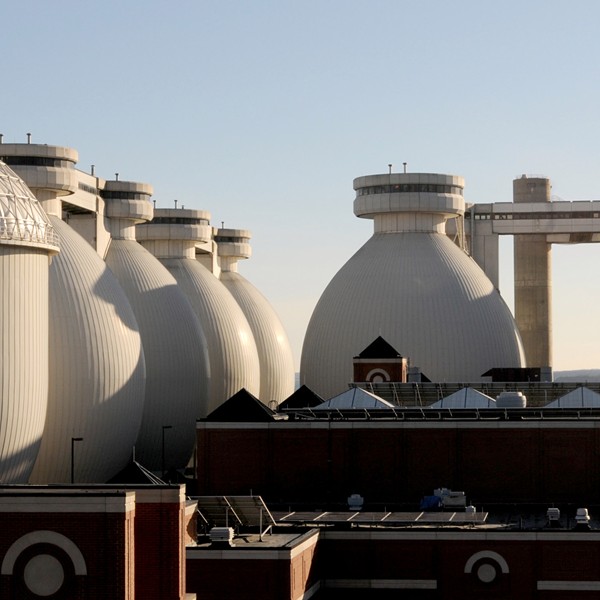I accept happiness when it drives up.
In these dismal times of rising seas, droughts, forest fires, intense storms, and the United States withdrawing from the Climate Change Accords, hydrogen cars are heading east.
George W. Bush was an advocate of hydrogen cars. Generally speaking, if he was for it, there was almost certainly a good reason to be against it. Back then, the reasons were that he was advocating them as a way to say that technology would be the answer, not regulations or government action, and that most everyone else was saying that hydrogen cars were a future dream, like power from safe nuclear fusion or colonizing Mars as an alternative human habitation when this planet was excessively trashed, too far away to consider seriously.
There are three ways to use hydrogen to move a vehicle.
The first is the same way NASA uses it to launch rockets. Do that with a car and it's fast, fun, and very impractical.
The second is the same way we use gas and diesel, in an internal combustion engine. The advantage is that the only waste product is water vapor. A hydrogen-powered internal combustion engine was first invented in 1807. One hundred and 58 years later, a high school student converted a Ford Model A to run on hydrogen, which is to say a normal car could be altered without much difficulty to run on hydrogen. Two hundred and a few years later, they're mostly showing up in concept cars and experimental vehicles.
The third is a hydrogen fuel cell. A membrane gets in the way of hydrogen's urge to join with oxygen to become water (H2O). It strips the electrons from the hydrogen and makes them travel through a circuit to get back to the hydrogen ions, which is what you call a hydrogen atom that's lost its electrons, as it joins the oxygen. Electrons through a circuit is electrical energy, and there you go, an electric car, trailing water vapor.
If you're in California and you see a hydrogen car, that's what they're running on, hydrogen fuel cells.
The advantage of hydrogen cars over battery operated is that they can go 300-plus miles on a single tank and refuel in minutes. Though Tesla has a car edging up on a 200-mile range and a super-charger that can do the job in 30 minutes, most e-cars go less than 100 miles on a full charge, and take one to six hours to recharge.
Toyota was first in the market with hydrogen cars. Over 1,000 are on the road, with a goal of 3,000 by the end of the year. Honda started just this this year.
There are already 30 hydrogen filling stations in California, so you can roam the whole state.
What got me excited is that hydrogen fueling stations are coming to the Bronx!
For those who don't know, the Bronx is what Brooklyn used to be before it became a destination for French people looking for fashionable restaurants. I wouldn't be surprised if a hydrogen station was coming to Brooklyn. In fact, one is. It's part of a set of 12, from Long Island, through New York, even into New Jersey, and on up to Boston.
Elon Musk says hydrogen fuel cells are "mind-bogglingly stupid" and other dreadful things. Musk is the CEO of Tesla, a company that's never made a profit, only sells 80,000 cars a year, yet became (however briefly), the most valuable car company in the world. His business is not just the e-vehicles, it's designing and building the batteries they run on.
Is he right?
Hydrogen is the most common element in our universe (the part that's not dark matter and dark energy). The problem is that hydrogen loves other elements so compulsively that it's always bonding with them to form hydrocarbons, water, whathaveyous, so you practically never see a hydrogen atom on his or her own, and if they are, they're so light that they float out of Earth's atmosphere. If you want hydrogen for fuel cells, you have to break it away from some other relationship. That costs energy. These days, most fuel cell hydrogen comes from natural gas. So isn't it more energy efficient, less expensive, and even greener, to just go ahead and use the natural gas as gas? The answer is well yes, sort of, and at the moment. If, sometime in the future, we used solar or wind power for electrolysis to take hydrogen from water, those answers all change. For the better.
In addition to Toyota and Honda, the companies betting on hydrogen cars include Audi, BMW, Ford, Mercedes-Benz, Pininfarina (0 to 62 mph in 3.4 seconds, goes 186 mph, and refuels in three minutes), there's a Welsh start-up, Riversimple, and General Motors has produced a monster military version.
The auto wars for the future appear to be batteries vs. hydrogen.
GM is actually much more invested in battery cars. They've been first to produce a mass market totally electric car, the Bolt, with a range of more than 200 miles, about $30,000 with the $7,500 federal rebate. They are not selling very well. But Tesla's version, which does not yet exist, has terrific sales.
Volvo has announced that it's going all electric or hybrid by 2019. Just two years from now. Volvo is owned by Geely, a Chinese company. A Swedish car maker going green is about as unexpected as spotting a single-speed bicycle in Brooklyn. But when it's secretly a Chinese car company, that's exciting. And much bigger. Geely intends to produce 1,000,000 electrified cars by 2025.
Norway, plans to be auto-emission free by 2025. The Dutch parliament (the lower house) has passed a bill that no new gas or diesel cars will be sold after 2025. France has plans to end the sale of gas and diesel cars by 2040. What's really important is that Peugeot-Citroen, their largest auto company, is onboard, already planning to be 80-percent hybrid and electric by 2023. India is talking about making all the cars in their country electric by 2030.
The politics over climate change, especially in America, are a treacherous place of lies, confusion, and delusion, fueled by big oil, big money, and ideology. The deniers will still be calling it a hoax when Atlantic waves meet tides from the Gulf of Mexico and salt the greens at Mar-a-Lago.
Hopefully, it won't come to that. They're being rescued, in spite of themselves, by liberal politicians in Europe, by China, by India, and, can you imagine this, the planet saved by General Motors.

















